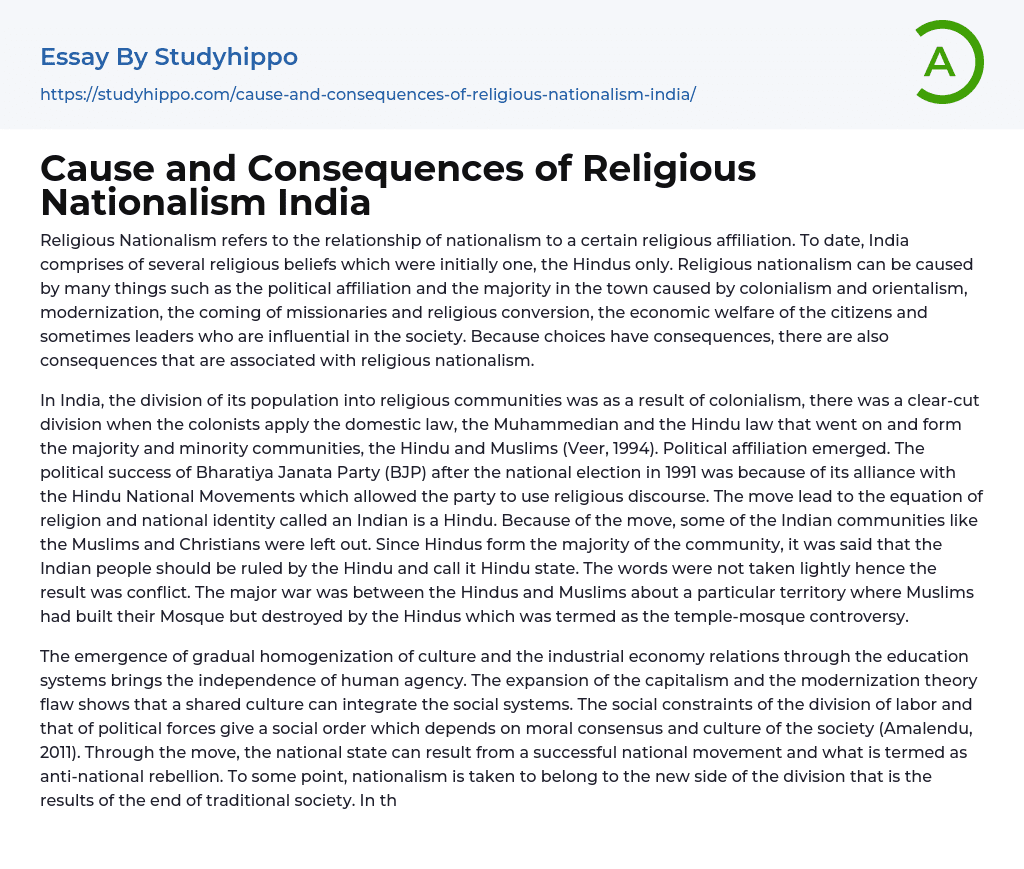

Cause and Consequences of Religious Nationalism India Essay Example
Religious Nationalism refers to the relationship of nationalism to a certain religious affiliation. To date, India comprises of several religious beliefs which were initially one, the Hindus only. Religious nationalism can be caused by many things such as the political affiliation and the majority in the town caused by colonialism and orientalism, modernization, the coming of missionaries and religious conversion, the economic welfare of the citizens and sometimes leaders who are influential in the society. Because choices have consequences, there are also consequences that are associated with religious nationalism.
In India, the division of its population into religious communities was as a result of colonialism, there was a clear-cut division when the colonists apply the domestic law, the Muhammedian and the Hindu law that went on and form the majority and minori
...ty communities, the Hindu and Muslims (Veer, 1994). Political affiliation emerged. The political success of Bharatiya Janata Party (BJP) after the national election in 1991 was because of its alliance with the Hindu National Movements which allowed the party to use religious discourse. The move lead to the equation of religion and national identity called an Indian is a Hindu. Because of the move, some of the Indian communities like the Muslims and Christians were left out. Since Hindus form the majority of the community, it was said that the Indian people should be ruled by the Hindu and call it Hindu state. The words were not taken lightly hence the result was conflict. The major war was between the Hindus and Muslims about a particular territory where Muslims had built their Mosque but destroyed by the Hindus which was termed as the temple-mosque controversy.
Th
emergence of gradual homogenization of culture and the industrial economy relations through the education systems brings the independence of human agency. The expansion of the capitalism and the modernization theory flaw shows that a shared culture can integrate the social systems. The social constraints of the division of labor and that of political forces give a social order which depends on moral consensus and culture of the society (Amalendu, 2011). Through the move, the national state can result from a successful national movement and what is termed as anti-national rebellion. To some point, nationalism is taken to belong to the new side of the division that is the results of the end of traditional society. In the pre-industrial world of India, it remains a catch-all category where the culture manifests itself.
Another cause of religious nationalism is religious conversion. Conversion provides a framework for understanding individual’s location in the society when explained in the context of identity. Religious Conversion implies both the spiritual and identity transformation for the person undergoing change. An individual who has converted can realize a new personal sacred quest and get a new religious self-identity. Also, the person who has turned in a social process assumes a new religion profile. In India, the one who has converted finds themselves in the realm of a political link in a way that they unsettle the secular fabric and the national unity the state upholds (Yves, 2013).
The inception of modernity and rapid social change can remove an individual from preexisting religious ties. Modernity has enabled people to move from one place to another while globalization of ideas has allowed the penetration of new institutions in
regions and religions (Amalendu, 2011). In India, the religious conversion from Hindu religion to another religion has been through globalization that has eventually center upon the new move that globalization has made available.
References
- Amalendu Misra, (2011) The Missionary Position: Christianity and Politics of Religious Conversion in India, Nationalism and Ethnic Politics, 17:4, 361-381,
- Veer, P. (1994). Religious nationalism: Hindus and Muslims in India. Berkeley u.a.: Univ. of California Press.
- Yves Lambert, (2004). “Religion in Modernity as a New Axial Age: Secularization or New Religious Forms?,” Sociology of Religion 60(3): 307



